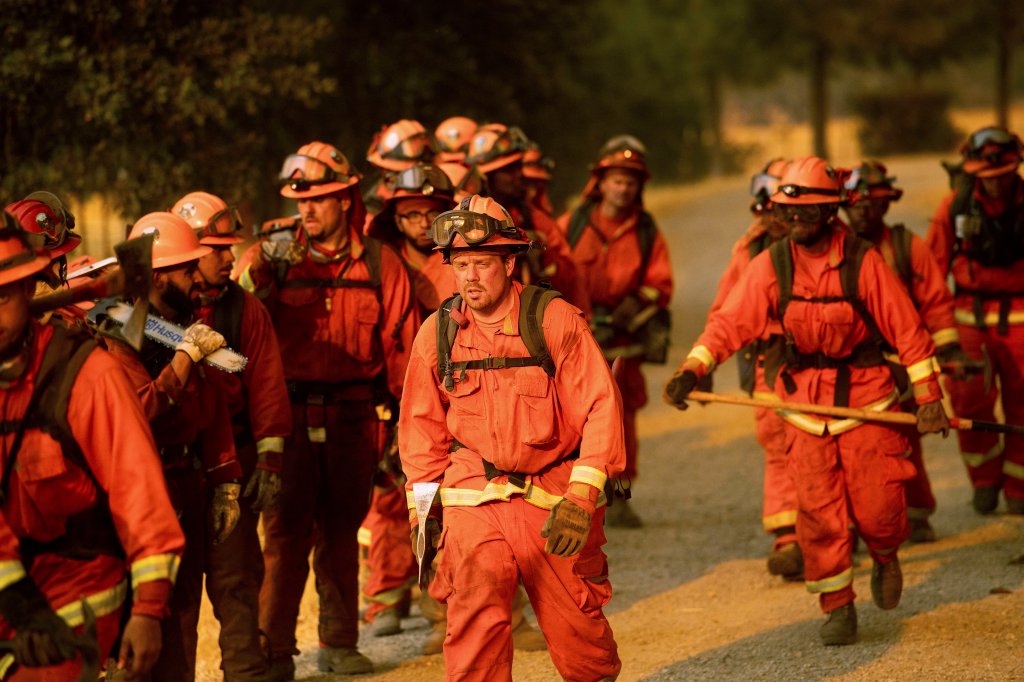The first fire I remember fighting happened in the dense mountains of Shasta-Trinity National Forest. Giant ponderosa pines crashed down around us with little warning, weakened by fire and shooting off embers like fireflies in smoke.
It was one of the few times in my life when I thought I might die at any moment — which is saying something, because I had already served 13 years in prison.
I was an incarcerated firefighter working in the shadows for $1 an hour and, like thousands of others, without many of the protections other firefighters receive for putting our lives on the line.
While the blazes in Los Angeles this year illuminated this disparity for the first time for many people, it has existed for far too long.
California has relied on incarcerated firefighters since 1915, when the Conservation Camp Program began. Today there are 35 conservation camps, also known as fire camps, across the state. Over the years, incarcerated people working in these camps have accounted for as much as a third of California’s force fighting wildfires, which grow larger and more terrible each year.
At one point while I was incarcerated, I worked 24-hour shifts for 42 straight days fighting fire, before I could rest at a base camp.
In 2018, during the record-breaking fires in Santa Barbara and Ventura counties, my fellow firefighters and I not only protected people’s homes but had the painful job of looking for their bodies in the aftermath of mudslides.
The work was mentally and physically grueling, but we had a sense of purpose and the chance to do good.
As incarcerated firefighters, we were told very early on that we would likely be barred from serving on a city, county or state fire crew upon release because of our records, though we have some of the lowest recidivism rates in the state.
When I was inside, I felt all the pride and satisfaction of working hard to help my community. But when I was out of the fire, the haze cleared. I felt numb and exploited for how little we had to show for putting our lives on the line.
Like thousands of others, I got out of prison with a concrete set of skills that I could not use to rebuild my life or support my family. I had to rely on them for so much because all the work I had done had paid so little.
Thankfully, as the California Legislature considers bills to prepare for and prevent future wildfires, it is also honoring the important and heroic work of incarcerated firefighters. One particularly important slate of seven bills this year, the Firefighting to Freedom package, would ensure that incarcerated firefighters earn a fairer wage, death benefits and real pathways to reentry.
When the next fire erupts, these incarcerated firefighters will be placed at the foot of the flames, just as I was years ago.
They will hike into burning landscapes where bulldozers can’t travel, create containment lines to stop the spread of fires that break record after record and try to survive while saving untold lives.
Between active fires they will clear brush to prevent future flames, work to avert deadly mudslides and help Californians flood-proof their homes. And with critical fire prevention hampered by the National Guard’s deployment to Los Angeles this year, their work will be more needed — and more dangerous — than ever. They are heroes.
Investing in their future by passing the Firefighting to Freedom package is not just a matter of fairness — it is an investment in the health and safety of all Californians.
I want the incarcerated firefighters of today and tomorrow to get the support they need to come home and continue helping our communities. Their work gets more dangerous each year, as California fires get fiercer and more frequent.
Andony Corleto is a former incarcerated firefighter who now works as a program associate for Vera California, part of the Vera Institute of Justice. Distributed by CalMatters.org.
